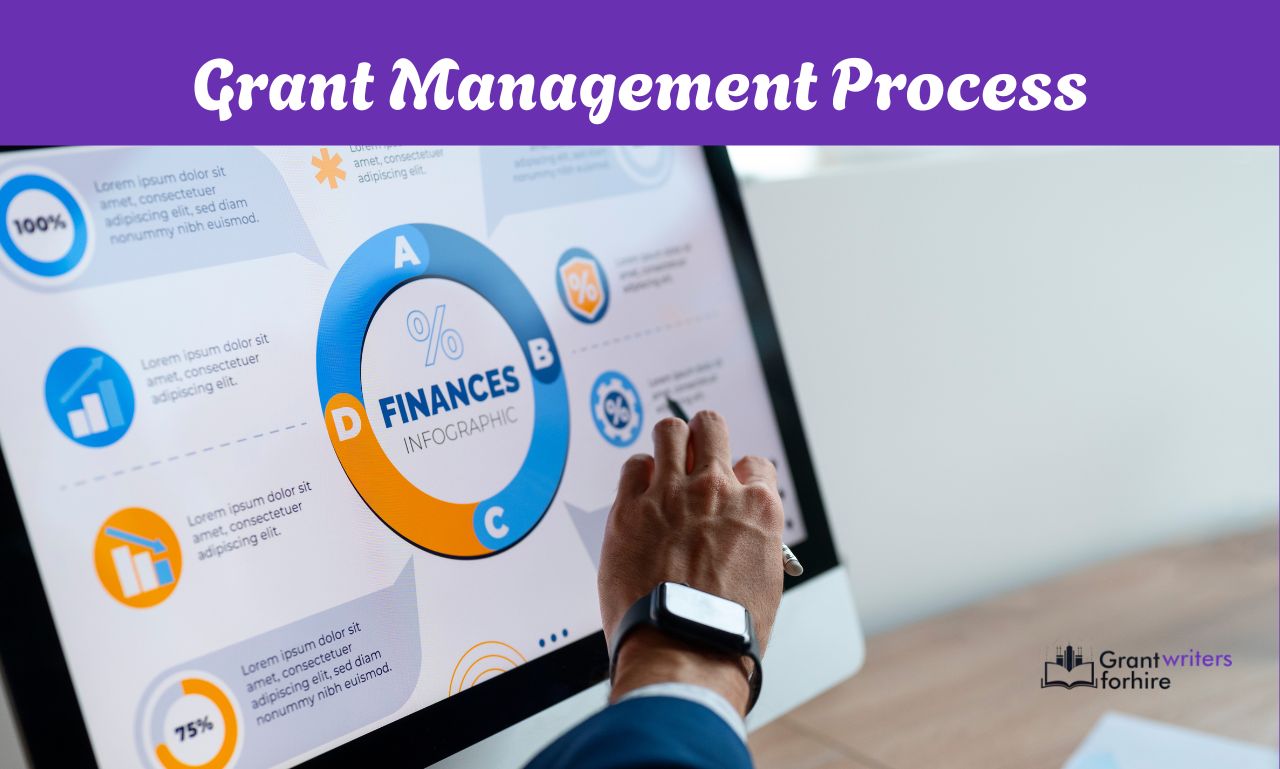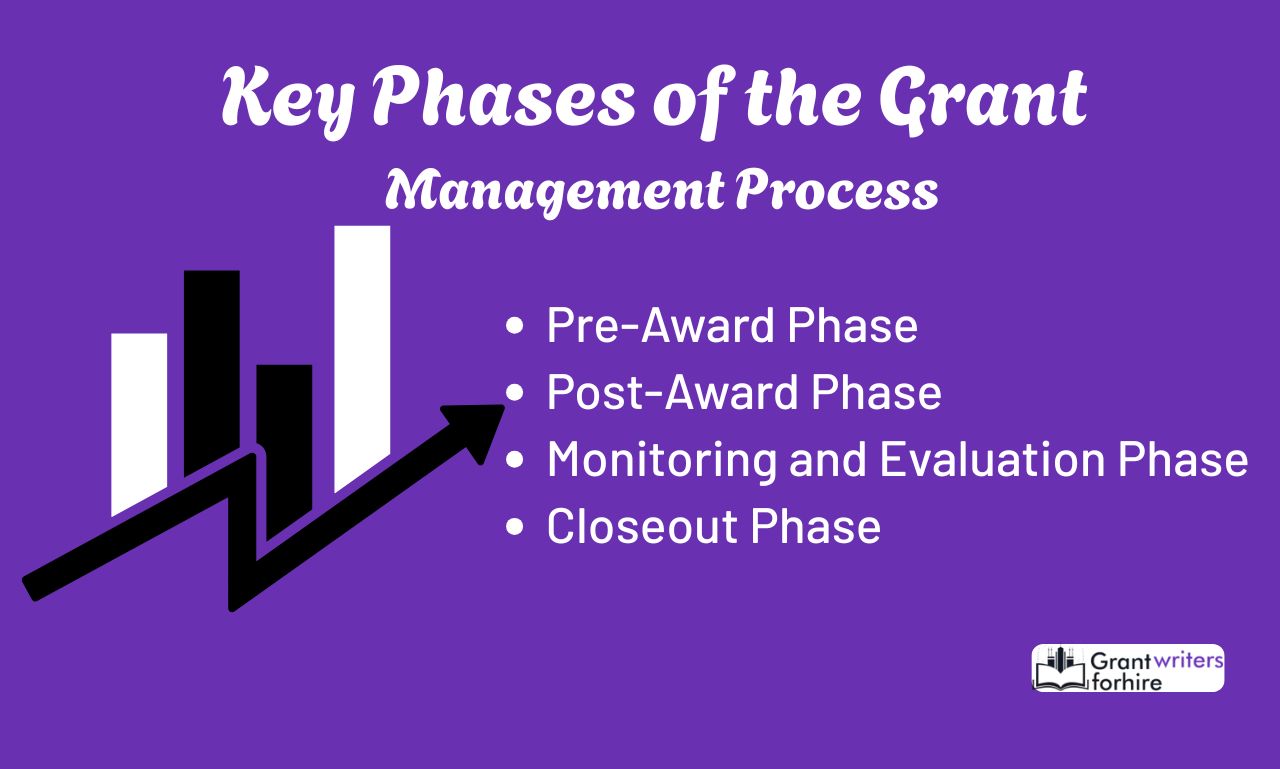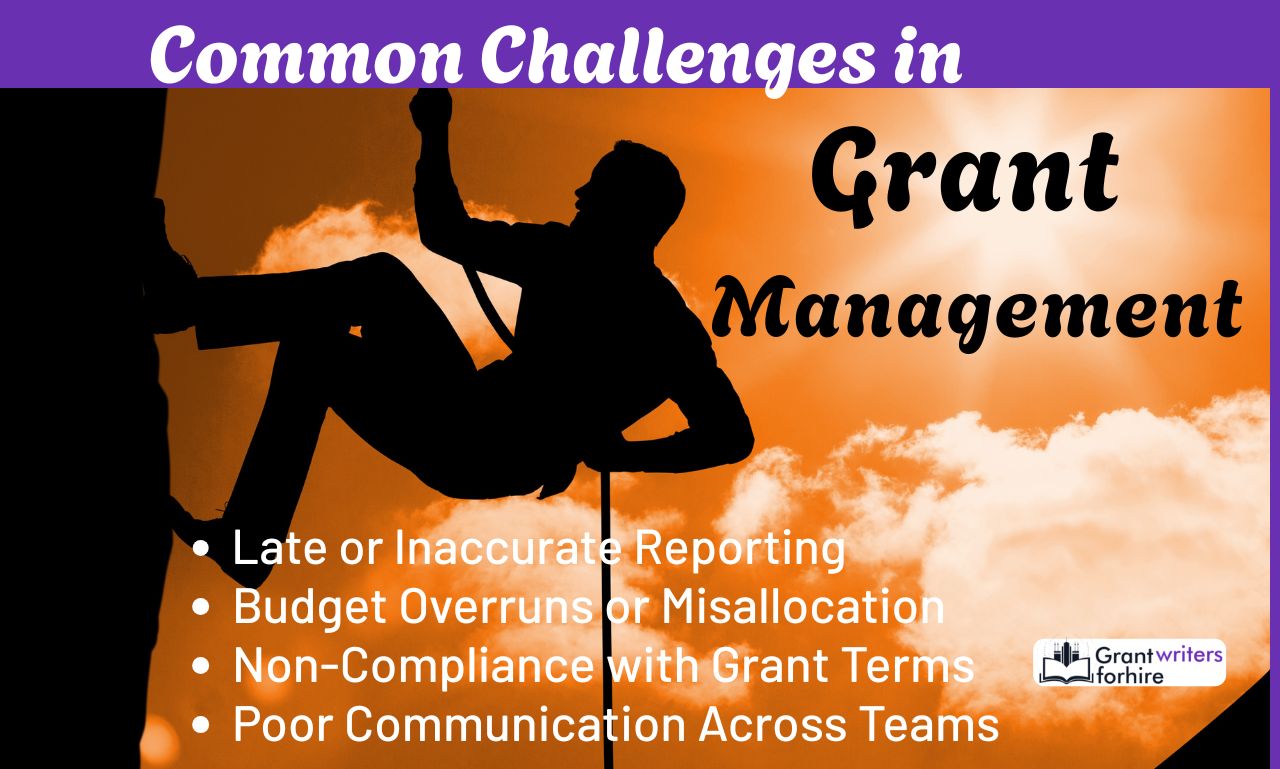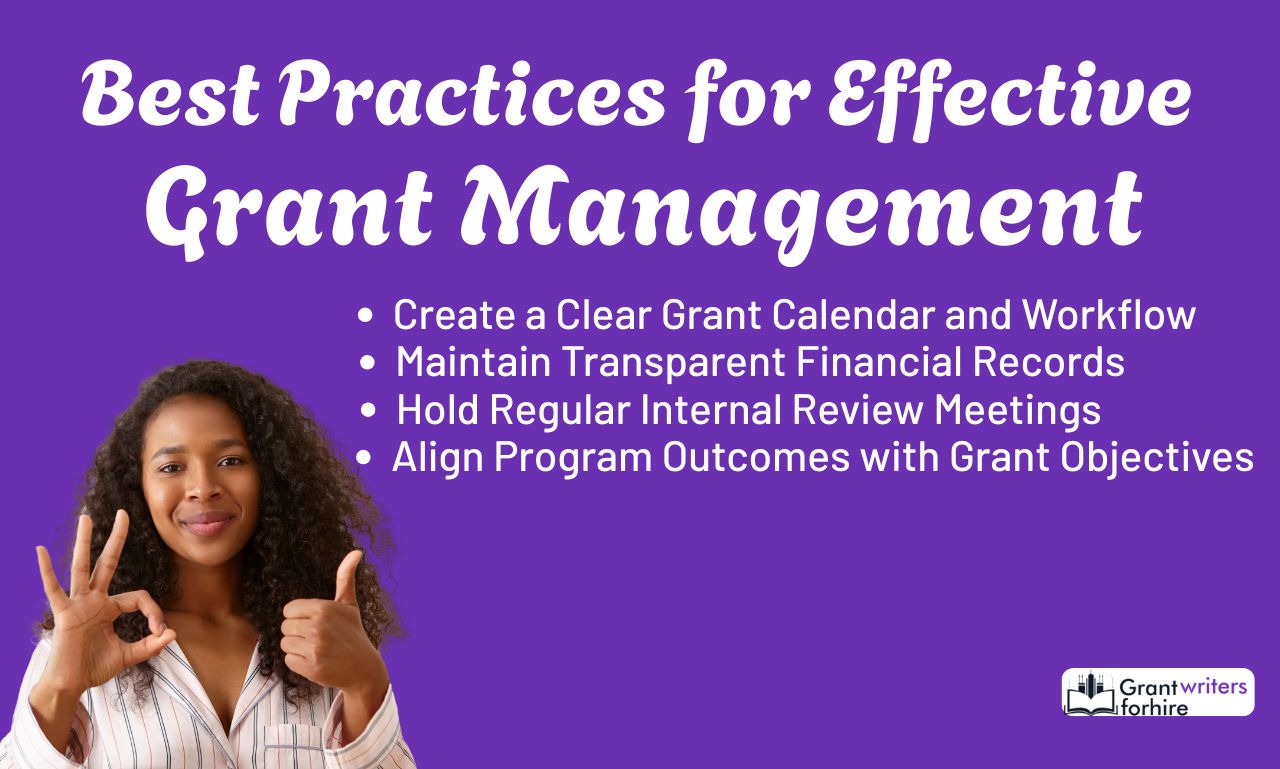Grant Management Process: Definition and Guide
The grant management process is a well defined approach used to oversee the planning, implementation, and reporting of grant funded projects. It ensures that all funds are used in compliance with the grantor’s guidelines and that project goals are achieved within the set timeline.

Effective grant management helps organizations maintain transparency, meet reporting requirements, and avoid financial or legal issues. It also strengthens the relationship between the grantee and the funding agency by demonstrating accountability and responsible stewardship of resources. This guide provides a clear overview of the grant management process, outlining key steps and best practices for successful execution.
What Is Grant Management?
Grant management is the process of handling a grant after it has been approved. It involves planning, tracking, and reporting how the funds are used. This helps make sure the money goes to the right activities and follows the funder’s rules. Knowing how to manage a grant well can help organizations stay organized and reach their project goals.
Definition and Purpose of Grant Management
The definition of grant management in simple terms is, it is the system used to manage grant money and activities from start to finish. Its main purpose is to make sure the funds are spent correctly and that all project goals are reached. This includes following rules from the funder, staying on budget, and finishing tasks on time.
Good grant management also helps find problems early and fix them before they get worse. It improves teamwork because everyone knows what needs to be done and when. It also supports clear communication between the organization and the funder. This process is important not only for using the money well but also for getting future grants. Generally, the purpose is to make sure the grant helps people as planned and that nothing goes wrong.
Who Is Responsible for Managing Grants?
Managing a grant is usually the job of someone called a grant manager, but others can help too. These may include project leaders, finance officers, and administrators. Everyone involved has to know what the grant rules are and follow them. The grant manager often watches the budget, prepares reports, and checks if the project is on track.
Sometimes, in smaller groups, one person may do many tasks. In bigger teams, duties are shared so each person focuses on their part. It is important for everyone to work together and talk often to avoid mistakes. The person or team in charge must also talk with the funder and give updates when needed. In the end, successful grant management depends on strong teamwork and clear roles.
Difference Between Grant Writing and Grant Management
Grant writing and grant management are two different things, though they are both important. Grant writing comes first and is about asking for the money. It includes researching the funder, writing the proposal, and sending in the application. Once the grant is approved, grant management begins. This means handling the money, tracking progress, and reporting to the funder.
Grant writing is more about getting the funds, while grant management is about using them the right way. Some people do both, but often they are handled by different team members. Understanding the difference helps organizations plan better and avoid confusion. Both steps are needed to make a grant project work well.
Why Grant Management Matters
Grant management is important because it helps organizations use grant money the right way. It keeps the project on track and makes sure all rules from the funder are followed. When grants are managed well, projects run smoothly and future funding becomes more likely. This section explains why managing a grant properly is key to success.
Ensuring Compliance with Funder Requirements
Every grant comes with rules that must be followed. These rules may include how the money should be spent, deadlines for reports, and what goals should be reached. Grant management helps organizations stay within these rules from start to finish. If the rules are not followed, the funder can stop the grant or ask for the money back.
Good grant managers keep track of all the rules and make sure each step is done correctly. This avoids problems and keeps the project safe from delays. It also shows the funder that the team is serious and responsible. In the long run, following rules well can lead to more funding opportunities.
Tracking Fund Usage and Reporting Outcomes
One of the most important parts of grant management is keeping track of how the money is spent. Every dollar must be used for the right purpose, and this needs to be recorded clearly. Reports must be shared with the funder to show progress and spending.
These reports help the funder see how the project is going and if it is meeting the goals. If money is not tracked well, the project can run into problems like overspending or missing targets. Strong tracking helps avoid these issues. It also helps the team make smart choices during the project. In the end, clear reporting builds a strong record that the team can use again in future grants.
Building Trust and Credibility with Funders
Managing a grant well builds trust between the funder and the organization. Funders want to see that their money is being used wisely. When reports are done on time and show good results, funders are more likely to support future projects.
Clear communication and honest updates also help build a good relationship. If the project goes as planned and the goals are met, it gives the funder confidence. This can lead to more funding and even long-term partnerships. Trust and credibility are not built in one day, but proper grant management makes it easier. It shows that the team is reliable, organized, and able to deliver results.
Key Phases of the Grant Management Process

The grant management process has different stages that help guide a project from beginning to end. Each phase has its own goals and tasks that must be done correctly to keep the project running smoothly. Knowing these phases helps teams stay organized and avoid mistakes. This section explains the four main phases: pre-award, post-award, monitoring and evaluation, and closeout.
Pre-Award Phase
The pre-award phase happens before the grant money is given. It includes finding the right grant, reading the rules, and preparing the application. During this time, the team decides if the grant is a good fit for their project. They collect needed documents and make a plan for how the money will be used.
This phase is very important because a strong plan can help win the grant. It also makes the next steps easier once the grant is approved. If anything is missed here, it can cause problems later. So, in this phase all must be handled with care and attention.
Post-Award Phase
The post-award phase begins after the grant is approved and the funds are received. This is when the team starts using the money as planned. They set up timelines, assign roles, and begin the project work. It is important to follow the rules set by the funder and keep good records.
Systems to track spending and progress are also set up in this phase. If the project is large, regular meetings and check-ins may be needed. Staying on schedule and using money wisely are key in this stage. It is a very important phase that helps turn the plan into real action.
Monitoring and Evaluation Phase
In the monitoring and evaluation phase, the team checks if the project is going well and meeting its goals. This includes watching how the money is spent and measuring the results of the work. Reports are made and shared with the funder to show progress. If problems are found, they can be fixed early.
At this phase also the team learns what is working and what is not. It keeps the project strong and focused. Funders like to see that projects are being checked often. Good monitoring builds trust and improves the final results.
Closeout Phase
The closeout phase happens when the project is finished. In this phase, the team checks if all work is complete and goals have been met. Final reports are written and sent to the funder. All records, receipts, and files must be in order.
The funder may review the project to make sure everything was done correctly. If the grant rules were followed well, the organization may be approved for future grants. The team can also get a chance to review what went well and what can be better next time in this phase. A strong closeout helps end the project on a good note and prepares the team for future success.
Essential Tools and Software for Grant Management
In today’s fast moving work environment, managing a grant without the right tools can be difficult and risky. Proper software helps teams stay organized, meet deadlines, and follow the funder’s rules. It also makes it easier to track spending, share updates, and keep important documents in one place.
Whether working on a small or large project, using helpful tools can improve how a grant is handled from start to finish. This section looks at some of the most useful tools for grant management, including systems for tracking, budgeting, and team coordination.
1.Grant Tracking Systems (GMS/CRM)
Grant tracking systems, also called Grant Management Software (GMS) or Customer Relationship Management (CRM) tools, help teams keep track of deadlines, reports, and funder details. These systems store all grant data in one place, making it easy to find information when needed.
They can also send alerts for report due dates or upcoming tasks. Some systems allow teams to follow the grant from start to finish. This helps avoid missed steps and improves team communication. With a good tracking system, everyone stays on the same page. These tools save time and lower the chance of mistakes. They are helpful for both small and large projects.
2.Budgeting and Accounting Tools
Budgeting and accounting tools help teams manage how the money from a grant is spent. These tools make it easy to plan, record, and track each expense. They also help compare the planned budget with the actual costs. This helps teams see if they are spending too much or staying on track. Many tools come with charts and reports that can be shared with funders.
Keeping good financial records is important for staying in line with funder rules. These tools also help during audits and end-of-project reviews. Using simple, easy-to-use budgeting tools helps avoid problems and keeps the project running smoothly.
3.Project Management Platforms (e.g., Asana, Trello)
Project management platforms like Asana and Trello help teams plan and complete their tasks on time. These tools allow users to create task lists, set deadlines, and assign work to team members. They also help teams see what has been done and what still needs attention.
Updates and progress can be shared in real-time. This is very useful when many people are working on the same project. These tools also reduce confusion and improve teamwork. When everyone knows their role and deadlines, the project is more likely to succeed. These platforms are easy to use and can be adjusted to fit different kinds of grant projects.
Roles in the Grant Management Team

Running a grant project well takes a team of people, each with a clear job to do. Every member of the team has a role that helps the project move forward and stay on track. From handling money to checking if the work is going as planned, each role is important. This section explains the key people involved in grant management and what they do to make the project successful;
Grant Manager or Program Officer
The grant manager or program officer leads the team and keeps the whole grant on track. They make sure all rules from the funder are followed and that reports are sent on time. This person also helps plan the project and solve problems that come up. They work with other team members to check progress and stay within the budget.
A good grant manager keeps clear records and talks often with the funder. They are often the main contact person for the project. Their job is to guide the team and make sure everything is done the right way. Without a strong leader, the project could face delays or miss important steps.
Finance Officer or Accountant
The finance officer or accountant is in charge of all the money matters. They keep track of how the grant money is spent and make sure it matches the approved budget. They also prepare financial reports to show the funder how the money is being used. This role helps prevent mistakes, like overspending or missing receipts.
A well equipped finance officer keeps records that are easy to understand and easy to find. They also work closely with the grant manager to plan and review spending. Their job helps build trust with the funder. When money is managed well, the whole project benefits.
M&E (Monitoring & Evaluation) Specialist
The monitoring and evaluation (M&E) specialist checks if the project is meeting its goals. They look at what has been done, what still needs to be done, and whether the work is helping the people it was meant to help. This person collects data, writes reports, and helps the team see what is working and what is not.
They also make sure the project stays on time and on track. Their work helps improve the results and shows the funder that progress is being made. Good M&E makes the project stronger and more useful. It also helps teams learn for future projects.
Program Implementers and Stakeholders
Program implementers are the people who carry out the daily tasks of the project. They may work in the field, teach others, or give services to the community. Stakeholders are people or groups who are affected by the project or have an interest in its success. This can include community members, partners, or leaders.
Both groups play a key role in making sure the project goals are reached. They give feedback, share ideas, and help solve problems. Their involvement makes the project stronger and more connected to real needs. Working with them builds support and trust. A productive grant team includes and listens to everyone involved.
Common Challenges in Grant Management

Managing a grant can be rewarding, but it also comes with many challenges. Mistakes in reporting, budgeting, or teamwork can cause delays or even loss of funding. Knowing the common issues in grant management can help organizations avoid them before they become serious. This section covers some of the most frequent problems that affect grant projects and explains why solving them early is important. They include;
Late or Inaccurate Reporting
Reports help show the funder that the grant money is being used properly. If reports are sent late or have wrong information, it can cause big problems. Funders may question the team’s ability to manage the grant.
Delays in reporting can also hold up payments or create trust issues. To avoid this, teams must keep good records and follow the timeline. Everyone should know when reports are due and what details must be included. Using clear tools and reminders can help keep reporting on track. Good reporting helps prove that the project is working as planned.
Budget Overruns or Misallocation
Spending too much or using the money on the wrong things is another big challenge. A grant budget must be followed closely to avoid overspending. If money is used for activities not approved by the funder, the grant may be canceled.
Budget mistakes can also lead to audits or the need to return funds. To prevent this, the finance officer must track spending often. The team should also check the budget before making any big decisions. Staying within the budget helps build trust and keeps the project running smoothly.
Non-Compliance with Grant Terms
Every grant has rules that must be followed. These rules cover how the money is used, what activities are done, and how results are shared. Breaking these rules is called non-compliance and can lead to serious consequences.
The funder may stop the grant or ask for money back. To stay compliant, teams need to read the grant terms carefully and follow them at every step. Regular reviews and checklists can help. When teams follow the rules, the project has a better chance of success.
Poor Communication Across Teams
Good communication is key to managing a grant well. When teams do not talk to each other, tasks get missed and confusion grows. This can lead to delays, errors, or missed deadlines. Everyone on the team should know their roles and share updates often.
Meetings, emails, or project tools can help keep everyone connected. Clear communication also helps solve problems faster. When teams work together and stay informed, the whole project runs better and reaches its goals.
Best Practices for Effective Grant Management

Managing a grant well takes more than just following rules. It requires good planning, clear steps, and regular check-ins to make sure everything stays on track. By using best practices, teams can reduce mistakes and improve results.
These practices help keep the project organized, make the funder happy, and support future funding. This section shares simple but important ways to manage grants more effectively.
Create a Clear Grant Calendar and Workflow
A grant calendar helps the team stay on schedule. It shows key dates like report deadlines, spending reviews, and project milestones. Having a clear workflow means everyone knows what to do and when to do it. This reduces confusion and missed steps.
A calendar also helps new team members quickly understand the timeline. Simple tools like shared digital calendars or spreadsheets can be used.
When tasks are planned ahead, the project runs more smoothly. Keeping a visible calendar helps the team stay focused and meet all funder expectations. It prepares grant writers to organize the content in terms of strategy and ensure successful implementation.
Maintain Transparent Financial Records
Keeping clear and honest financial records is very important in grant management. It helps the team track where the money goes and avoid overspending.
These records should be updated often and easy to understand. Funders may ask to review them at any time, so they must be accurate.
Good records also help during audits and when writing reports. The finance officer should work closely with the grant manager to review spending.
When financial records are well kept, the team builds trust with the funder. This also helps the group prepare for future grants.
Hold Regular Internal Review Meetings
Review meetings give the team a chance to check on progress and fix problems early. These meetings can be weekly or monthly, depending on the size of the project.
Everyone can share updates, ask questions, and suggest improvements.This helps the whole team stay informed and connected. It also allows leaders to spot issues before they get worse.
Notes from each meeting should be kept for future reference. These meetings also build teamwork and improve communication. Having regular reviews keeps the project strong and on track.
Align Program Outcomes with Grant Objectives
Every grant has specific goals, and the work done must match those goals. This means the team should always check if their results match what the funder wants to see.
Keeping this alignment helps the team stay focused and avoid doing activities that are not allowed. It also makes reporting easier because results can be linked directly to the grant objectives.
If changes are needed, the team should update the plan and talk to the funder. Staying in line with the grant’s purpose shows responsibility. It also increases the chance of getting future support.
Grant Management for Nonprofits, Government & Private Sector
Different types of organizations manage grants in different ways. Nonprofits, government offices, and private companies all have their own rules and goals when handling grant money.
Each group must follow specific guidelines, depending on who gave the grant and what the money is to be used for. Understanding how grant management works across these sectors helps improve compliance and results.
This section explains the key differences in grant handling for nonprofits, government agencies, and private businesses.
Unique Compliance Requirements by Sector
Each sector has its own rules when it comes to how grant money should be used. Nonprofits often have to follow donor rules and show how the money helps the community.
Government agencies must meet strict legal and financial laws, sometimes with more paperwork and review. Private companies on the other hand, may focus more on outcomes and return on investment. These different rules mean that each group must pay close attention to what is expected.
If they do not follow these rules, they could lose funding or face legal problems. Teams must be trained to understand and meet the rules that apply to them. A good compliance plan helps prevent mistakes and builds trust with funders.
Reporting to Donors vs Government Agencies
The type of reports needed can also change depending on who gave the grant. Donors, like foundations or private supporters, usually want clear stories, results, and easy-to-read updates.
They care about how the money helped people or solved a problem. Government agencies often need detailed reports with numbers, data, and proof that every rule was followed. These reports can take more time and require more staff.
It is important for the grant team to know what kind of reports are needed and when to send them. Keeping good records from the beginning makes reporting easier. Each type of report helps show that the project is working and that the money was used the right way
Scalability of Grant Management Systems
As an organization grows, managing more grants becomes harder without the right systems. Scalability means being able to handle more tasks or bigger projects without losing control.
A small nonprofit may start with simple tools like spreadsheets. But as they get more grants, they might need software that can manage many reports, budgets, and team roles.
Government offices and large companies often use bigger systems from the start. These systems help save time, reduce mistakes, and make it easier to track results. Choosing the right tools that can grow with the organization is very important. A system that fits today’s needs and can grow tomorrow supports long-term success.
When to Hire a Professional Grant Manager
Not every organization needs a full-time grant manager from the start, but as projects grow, the workload can become too much for regular staff. Managing grants involves tracking deadlines, budgets, reports, and strict rules, which can be hard to handle without help.
A professional grant manager brings the experience and focus needed to keep everything in order. This section explains specific situations when hiring a grant manager becomes a smart and necessary step:
Managing Multiple Grants Simultaneously
Handling one grant can already be a big job, but managing several at once needs more time and skill. Each grant may have different timelines, budgets, and reporting needs.
A professional grant manager knows how to keep everything in order without missing deadlines. They can help track each grant’s progress and make sure all spending is correct. This helps reduce stress and lowers the chance of losing funding. When many grants are active, one mistake can affect the others.
Having someone focused only on grant work makes sure nothing is forgotten. It also lets the rest of the team focus on the program itself.
Scaling a Program with New Funding
When a program is growing and getting more funding, things can become more complex. New money often means more staff, activities, and rules to follow.
A grant manager can help plan how to use the money wisely and keep the growth under control. They make sure new steps match the original goals and follow the funder’s rules.
As programs expand, small problems can turn into big ones if not managed well. Having someone with grant experience helps the team stay ready for these changes.
They also help set up systems that support long-term success. This is very helpful when moving from small projects to larger ones.
Meeting Strict Federal or State Regulations
Federal and state grants often come with detailed rules that must be followed. These can include special reporting formats, spending limits, and audit checks. A professional grant manager understands these rules and makes sure nothing is missed.
They help prepare the needed paperwork and keep records ready for review. If the rules are broken, the grant can be taken away or money may need to be returned. That is why having someone who knows these laws is important.
They protect the organization from risk and help build a good relationship with funders. This is especially useful for groups new to government funding.
Grant Management FAQs
1.How long does grant management last after an award?
Grant management begins as soon as the grant is awarded and usually continues until all work is finished and final reports are sent. The length of time depends on the project. Some grants may last a few months, while others go on for several years. Even after the main work is done, there are still closing steps like financial reports and evaluations.
Teams must stay active during this time to make sure everything is in order. Keeping clear records and following the grant’s timeline helps the process end smoothly. The closeout phase is important and should not be rushed. Ending a grant properly helps improve chances for future funding.
2.What happens if you miss a reporting deadline?
Missing a deadline can lead to serious problems. Funders expect reports to arrive on time so they can see how the money is being used. If a report is late, the funder may stop sending more money or even cancel the grant.
Some funders might allow a short delay if the team gives a reason early enough. But missing deadlines often damages trust and could hurt chances of getting another grant in the future. Teams should use calendars, reminders, or software tools to stay on schedule. Good planning can prevent last-minute problems. Meeting deadlines shows that the team is responsible and organized.
3.Can one person manage multiple grants?
Yes, one person can manage more than one grant, but it depends on the size and needs of each project. If the grants are small and simple, one person may be able to keep track of everything. But with large or complex grants, it becomes harder to manage them alone. It can lead to missed details or delays. As the number of grants grows, it is smart to add more help or use support tools. Sharing tasks with a team can also reduce stress. A strong system makes it easier to handle multiple grants at once.
4.Is grant management software necessary for small nonprofits?
Small nonprofits can often start with basic tools like spreadsheets and calendars. But as they grow or handle more grants, software becomes more useful. Grant management software helps track spending, deadlines, reports, and more in one place. It saves time and lowers the chance of errors. Even a small tool can make a big difference. There are also low-cost or free options for smaller teams. In the long run, having a good system can help the organization stay organized and ready for future funding.

